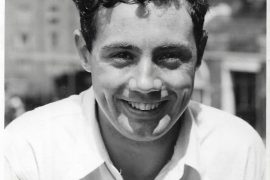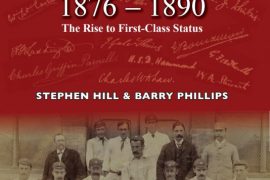
by Steve Tancock with thanks to Stephen Hill and Barry Phillips, authors of “Somerset Cricketers ….“ and Mike Tarr for permitting me to use his beautiful portrait of Somerset’s legendary post-war groundsman.
There has been a lot of talk about pitch preparation already this season. Criticism of the surface at the Cooper Associates County Ground has morphed into praise for the Warwickshire pitch while elsewhere we’ve seen a worrying trend of early-season batting paradises which are producing bore draws in the absence of contrived finishes. So I thought for the next in the series of Somerset cricketers I’d feature Cecil Buttle, the man responsible for the County Ground for over thirty years spanning the start of my Somerset supporting life.
I’ve made no bones about the choice of players I’m featuring from Somerset Cricketers being anything other than a personal selection. And that’s going to continue for a while. So you ask what brings me to write, so early in this endeavour to someone who, while he played for Somerset, was not a legend for his on-field performance?
The answer is Taunton Deane Cricket Club. When Cec retired from his almost life-long role at The County Ground he couldn’t retire in the conventional sense. Such was his love of cricket and his passion for producing beautiful pitches and grounds that he needed to keep going.
I cannot recall when he arrived at the top of Vivary Park but I’m going to guess in the latter part of the seventies at a time when I was trying to achieve my dream of being good enough to play for my beloved Somerset. Honestly by this time I had realised that wasn’t going to happen but I also knew that I wanted to play club cricket at as high a level as possible for as long as possible.
The young me was a kid who had been brought up in a family one generation removed from farming but still surrounded by relatives, my father included, who were very keen gardeners. I am also from a generation who was expected to do their share of chores around schoolwork and, I’d like to think, had a real sense of helping out whenever possible.
So by the time I met Cecil I knew a fair amount about lawns and growing things and wanted to do whatever I could to help out around my cricket club. Cec was never one to hold back so when he saw a teenager who wanted to help he saw the opportunity to make me a sort of apprentice. I wasn’t the only one who helped, by no means, but the fact that I was available in the summer holidays, especially when others were working meant I could do more than most.
For the next few summers, my life was as near to heavenly as possible. The five year period which, if such things were possible, I’d re-live again at the drop of a hat. School and then university were going well, Somerset were “the team to watch” and I was playing cricket to a pretty decent level as much as I could. But, thanks to Cecil it got even better.
Not only did he teach me the fundamentals of pitch preparation he was quite happy to give me a list of tasks and let me get on with them. So I’d rock up at The Deane on the morning of a midweek game, get the mowers out, cut the outfield and, after I’d passed muster, roll the pitch.
Cec would “supervise” and guide me while doing the important jobs I wasn’t trusted to. And quickly, very quickly I learnt more about the combination of science and art that is pitch preparation.
There was another dimension to working with Cecil though, the endless stories he would tell of his time at the County Ground. Recalling names I had heard from Dad, great games and visiting touring teams. He was also never backward in coming forward with advice to anyone – whether they asked or not – on their game!
Cecil makes me think of Bill Shankly. While I never met Liverpool’s legendary manager Cecil was much as I imagined Bill to be. Endowed with a work ethic that was so common in his time he was despite being from humble stock he was an immensely proud man. You had to earn his friendship and trust but once you did he was fiercely loyal and did all he could to help you. Like Shankly, I suspect that leaving his beloved club was harder than he imagined. I recall him telling me that he found it hard to go back to the County Ground for reasons of both not wanting to appear to be looking over Phil Frost’s shoulder and because of the emotions he felt for the place. One thing is for sure Somerset County Cricket Club were as lucky to have had Cecil and Liverpool were Bill.
Perhaps the memory that encapsulates Cecil for me is him watering the square after a game. He believed in watering the square as soon as possible after a game. In high summer almost flooding it so that it was in the best condition for the next game. You would come out of the dressing room after the game and there he was hauling the hosepipe out and lovingly tending to his beloved square. I may be a little biased but the pitches at The Deane in those days were perfect cricket wickets.
When he was happy he had done all he could to the ground he would retire to the pavilion bar and sit in the corner talking cricket and groundsmanship to whoever was around. I suspect he was as happy at that time of his life than at any other time.
Sadly those blissful summer days had to end for me. The necessities of work meant that after I graduated I moved away from Somerset. Saying goodbye to Cecil and everyone at Taunton Deane was one of the hardest things I’ve ever done. But those memories have lasted a lifetime and I’m happy to say that what I learned from Cec has formed a huge part of the person I have become. Thank you Cecil.
And the lawn looks pretty good too!
But that’s enough of me. It’s time to hand over to Barry and Stephen and, with as ever, great thanks to them both for their biography of Cecil Frederick Douglas Buttle from volume 2 of their definitive work. If you haven’t got your hands on all of these wonderful books you can get them here.
22 May 1926 v. Gloucestershire, Taunton
David Foot writes of Cec Buttle that he was ‘the son of a sergeant major and had the shoulders and torso of a fast bowler’. Born in Norton Fitzwarren on 11 January 1906, Cec attended North Town School. Seemingly something of a young tearaway, he was made to appear in court as a twelve-year-old, had up, along with a gang of friends, for having committed wilful damage to the French Weir Free Bathing Station. 400 tiles had been broken, most of the coat hooks removed and a number of doors smashed. Cec and his gang were each fined four shillings.
He had learned his lesson and by the age of fourteen was offered a job assisting Ernie Robson on the ground staff at the County Ground, earning the princely sum of eight shillings a week. After Robson’s departure, Cec was for many years assistant groundsman to the inimitable ‘Fernie’.
According to Peter Roebuck, Fernie was ‘a Maltese cockney [born Fernando] with an air of distinction’, who was fond of sitting in Scarlett’s pub, issuing instructions to his staff, including Cec, while drinking bass with his chum, the tall and gangly Lord Portman. Locals still recall two sharp bends in the road between the villages of Orchard Portman and Staple Fitzpaine being referred to as ‘Portman’s Corners’ on the basis that his lordship had been known to leave the road at those hazards, car and driver having to be rescued, the one needing repairs and the other in a state of advanced inebriation. (Steve – as someone who comes from a family brought up in Shoreditch I can confirm the name stuck)
Cec Buttle would finally become Head Groundsman once Fernie had retired and he would remain in the role for thirty years. During his working life he witnessed significant changes. He would reminisce about being sent to the local stables – Herd’s of St James’s Street – early each morning to secure the services of a hump-backed horse, the only one whose hooves fitted the specially made leather shoes that protected the turf as it helped to pull the heavy machinery. After the horse’s sad demise, he would go to the labour exchange to summon men to pull the roller.

Later still, he would be seen sitting astride the mower and heavy roller. He is as responsible as anyone for County Ground becoming for so many years a batsman’s paradise. In order to achieve the desired outcome he used marl (from a brickworks in Wellington) that was crushed to a fine powder. He also advocated the use of worms to give a wicket ‘air and pace’. Three weeks before a match he would draw the worms to the surface using mustard powder and remove them to another wicket.
His advice was sought and his unconventional methods deployed at a number of grounds in the area, though the festival pitches proved more of a challenge. Once he arrived at the Bath ground two days before the festival to find ‘knee-high grass’. Perhaps this was an exaggeration, but it is certainly true that despite his best efforts the festival pitches were often not fit for purpose. He would always stride onto the pitch at the fall of the ninth wicket to consult the fielding captain over which roller was required between innings. On one occasion at Bath, on a very poor wicket about which Cec could have done little, Cyril Washbrook, responded, inserting expletives, that Cec should get a chain harrow to level what looked little more than a ploughed field.
Cec was married in 1929 to Edith Love Lee, known as Edie, a longsuffering partner who lived with him for many years in a caravan in the car park at the ground. Edie ‘laundered the towels for a penny each, drying them on a line in the Ridley Stand’. They had no children but their cats were a feature at the County Ground, visible on match days but keeping their distance during the greyhound meets held on a regular basis. He was a fast-medium bowler – very quick by club standards – and was regularly deployed in the nets at the County Ground. In his two matches for the county he averaged 2.66 with the bat and took no wickets, conceding 72 runs. He was also called on both by Somerset and their opponents at Taunton as a substitute fielder, though he reported that he regarded this as something of a chore. Used regularly as an umpire in non-first-class fixtures, including a number of Second XI matches, he was asked on one occasion to officiate in a first-class fixture against Yorkshire as emergency cover, though only at square leg.
He also served as a fireman for many decades, including a period with Somerset and England cricketer Harold Gimblett, during the Second World War. Harold apparently drove the silver Rolls Royce that had belonged to the late Somerset President, Henry Murray-Anderdon, to and from fires. Cec would recount that the sights they saw and the friends and colleagues killed broke Harold’s spirit.

Having retired from the County Ground, he tended the wicket at Taunton Deane until his death at St Margaret’s Hospice in Taunton on 15 December 1988 at the age of eighty-two. Not long before, he had joked with a reporter that ‘old groundsmen never die, they just keep rolling along’.


















